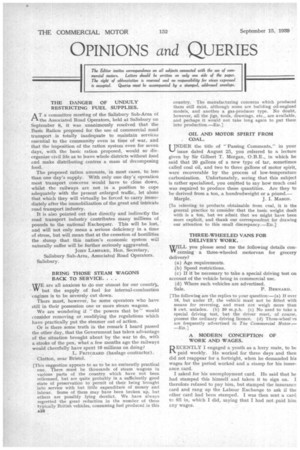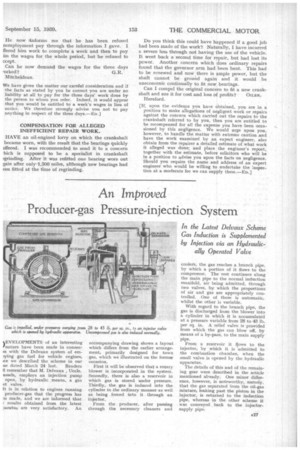OPINIONS and QUERIES A T a committee meeting of the Salisbury
Page 36

Page 37

If you've noticed an error in this article please click here to report it so we can fix it.
Sub-Area of the Associated Road Operators, held at Salisbury on September 8, it was unanimously resolved that the Basic Ration proposed for the use of commercial road transport is totally inadequate to maintain services essential to the community even in time of war, and that the imposition of the ration system even for seven days, with the basic ration proposed, would so disorganize civil life as to leave whole districts without food and make distributing centres a mass of decomposing food.
The proposed ration amounts, in most cases, to less than one day's supply. With only one day's operation most transport concerns would have to close down, whilst the railways are not in a position to cope adequately with the present enlarged traffic, let alone that which they will virtually be forced to carry immediately after the immobilization of the great and intricate road transport industry.
It is also pointed out that directly and indirectly the road transport industry contributes many millions of pounds to the national Exchequer. This will be lost, and will not only mean a serious deficiency in a time of stress, but will mean that at the cessation of hostilities the slump that this nation's economic system will naturally suffer will be further seriously aggravated. JOHN LAMPARD, HOD. Secretary, Salisbury Sub-Area, Associated Road Operators. Salisbury.
BRING THOSE STEAM WAGONS BACK TO SERVICE. . .
are all anxious to do our utmost for our country, • but the supply of fuel for internal-combustion engines is to be severely cut down.
There must, however, be some operators who have still in their possession one or more steam wagons.
We are wondering if" the powers that be" would consider removing or modifying the regulations which have practically put the steamer out of action.
Or is there some truth in the remark I heard passed the other day, that the Government has taken advantage of the situation brought about by the war to do, with a stroke of the pen, what a few months ago the railways would cheerfully have spent 10 millions on doing?
L. PRITCHARD (haulage contractor). Clutton, near Bristol. ` [This suggestion appears to us to be an eminently practical one. There must be thousands of steam wagons in various parts of the country which have not been relicensed, but are quite probably in a sufficiently good state of preservation to permit of their being brought into service with but little expenditure of money and labour. Some of them may have been broken up, but others are possibly lying derelict. We • have always regretted the great reduction in the number of these typically British vehicles, consuming fuel produced in this
country. The manufacturing concerns which produced them still exist, although some are building oil-engined models, and another a gas-producer type. No doubt, however, all the jigs, tools, drawings, etc., are available, and perhaps it would not take long again to put thesis into production.—ED.]
OIL AND MOTOR SPIRIT FROM COAL.
TNDER the title of "Passing Comments," in your issue dated August 25, you referred to a lecture given by Sir Gilbert T. Morgan, 0.B.E., in which he said that 20 gallons of a new type of tar, sometimes called coal oil, and two to three gallons of motor spirit, were recoverable by the process of low-temperature carbonization. Unfortunately, seeing that this subject is rather specialized, you omitted to say how much coal was required to produce these quantities. Are they to be derived from a ton, a hundredweight or a pound.—
Marple. J. I. MASON.
[In referring to products obtainable from coal, it is the general practice to consider that the basic weight dealt with is a ton, but we admit that we might have been more explicit, and thank our correspondent for drawing our attention to this small discrepancy.—En.]
THREE-WHEELED VANS FOR DELIVERY WORK.
WILL you please send me the following detailonm
vy concerning a three-wheeled motorvan for grocery delivery?
(a) Age requirements.
(b) Speed restrictions.
(c) If it be necessary to take a special driving test on account of the vehicle being in commercial use.
(d) Where such vehicles are advertised.
Sale. P. BERNARD.
[The following are the replies to your question:—(a) If over 16, but under 17, the vehicle must not be fitted with means for reversing, and must not weigh more than 8 cwt. unladen. (b) 30 m.p.h. (c) No need to take a special driving test, but the driver must, of course, possess the ordinary driving licence. (d) Three-wheel,rs are frequently advertised in The Commercial Motor.-En.]
A MODERN CONCEPTION OF WORK AND WAGES.
RECENTLY I engaged a youth as a lorry mate, to be N. paid weekly. He worked for three days and then did not reappear for a fortnight, when he demanded his wages for the period worked and a stamp for his insurance card.
I asked for his unemployment card. He said that he had stamped this himself and taken it to sign on. I therefore refused to pay him, but stamped the insurance card and rang up the Labour Exchange to ask if the other card had been stamped. I was then sent a card to fill in, which I did, saying that I had not .paid him any wages.
He now informs me that he has been refused nemployment pay through the information I gave. I ffered him work to complete a week and then to pay im the wages for the whole period, but he refused to ccept.
Can he now demand the wages for the three days rorked? G.R. Mitcheldean.
We have given the matter our careful consideration and if the facts as stated by you be correct you are under no liability at all to pay for the three days' work done by the person to whom you refer. Indeed, it would appear that you would be entitled to a week's wages in lieu of notice. We therefore strongly advise you not to pay anything in respect of the three days.—En.]
COMPENSATION FOR ALLEGED INEFFICIENT REPAIR WORK.
HAVE an oil-engined lorry on which the crankshaft became worn, with the result that the bearings quickly iffered. I was recommended to send it to a concern hich is supposed to be a specialist in crankshaft Igrinding. After it was refitted one bearing wore out gain after only-1,500 miles, although new bearings had een fitted at the time of regrinding.
Do you think this could have happened if a good job had been made of the work? Naturally, I have incurred a severe loss through not having the use of the vehicle. It went back a second time for repair, but had lost its power. Another concern which does ordinary repairs found that the governor arm had been bent. This had to be renewed and now there is ample power, but the shaft cannot be ground again and it would be uneconomic continually to fit new bearings.
Can I compel the original concern to fit a new crank shaft and sue it for cost and loss of profits? OILER. Hereford.
[If, upon the evidence you have obtained, you are in a position to make allegations of negligent work or repairs against the concern which carried out the repairs to the crankshaft referred to by you, then you are entitled to be recompensed for all the expense you have been occasioned by this negligence. We would urge upon you, however, to handle the matter with extreme caution and have the work examined by an expert engineer, also obtain from the repairer a detailed estimate of what work it alleged was done; and place the engineer's report, together with the estimate, before solicitors who will be in a position to advise you upon the facts on negligence. Should you require the name . and address of an expert engineer who would be willing to undertake the inspection it a moderate fee we can supply these.—.Eo.1




























































